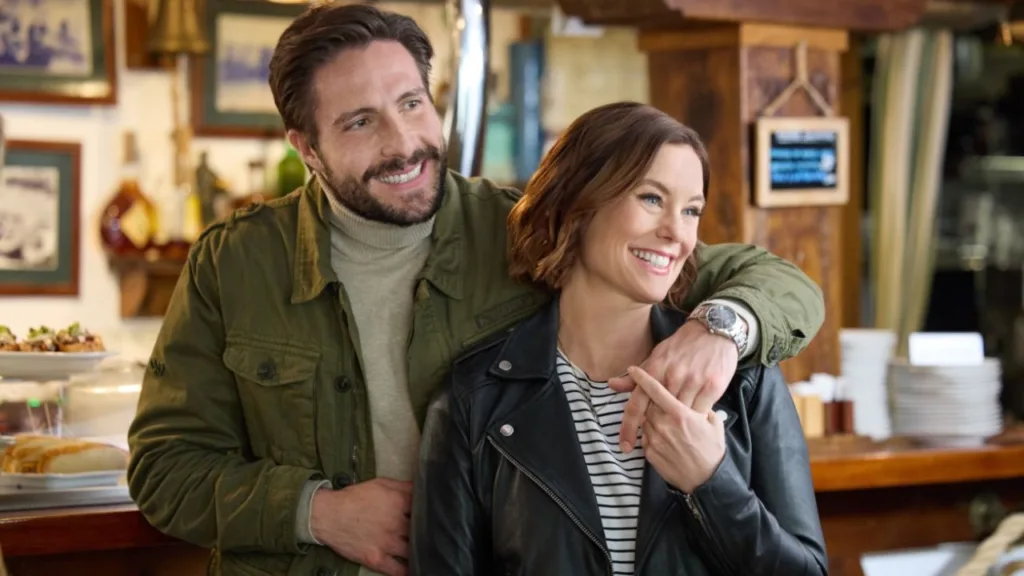Every good story starts with a clear objective. For Anna Kelly, an American food writer with a knack for finding the heart of a dish, the main quest is to land a career-defining story. Her journey brings her back to the vibrant streets of Barcelona, ostensibly for a celebratory side quest: her best friend Erica’s engagement.
The city itself feels like a beautifully rendered open world, rich with texture and potential encounters. The narrative kicks into high gear with the requisite “meet-cute,” a classic storytelling beat. Anna’s run-in with Javier Estrella over the sticker shock of his family’s legendary saffron is pitch-perfect. It’s not just a humorous clash; it’s a character-establishing moment that sets up her earnest charm against his deep-seated pride.
The scene operates like the first critical dialogue choice in an adventure game, defining the relationship path from the outset. Their first evening together is paced effectively, moving from awkwardness to a palpable connection, leaving you with the distinct feeling that this chance meeting has just unlocked a major plotline.
The Core Mechanic: A Fake Engagement
The film’s central narrative mechanic is a trope as old as storytelling itself: the fake engagement. Like a core gameplay loop, this premise dictates every subsequent interaction and decision. A series of conveniently timed mishaps—chief among them a dead electric car battery—strands Anna in Javier’s impossibly hidden village.
Here, we learn about his narrative constraint, a timed mission to marry before the saffron harvest or forfeit his family’s legacy. It’s a high-stakes objective set by his traditional mother. When his family discovers Anna and makes the convenient assumption, the duo sees a path to mutual victory. They strike a deal that feels like a transactional quest agreement.
She’ll play the fiancée, and in exchange, she gets an all-access pass to document the secrets of their farm for her career-making article. This structure, while predictable, is effective. It forces the characters into a shared space and a shared secret, creating a fertile ground for the kind of emergent storytelling and authentic character development that makes relationship-focused narratives compelling.
Gaining Affinity Points
With the rules of engagement set, the film focuses on building the relationship, a process that feels like watching two characters gain affinity points in real time. The witty banter and moments of shared vulnerability between Anna and Javier serve as the primary experience points, leveling up their connection from a convenient arrangement to something genuine.
The narrative design is particularly strong in how it develops Anna’s personal arc. As an orphan, her acceptance into Javier’s warm, boisterous family provides a powerful emotional reward, fulfilling a need for belonging she didn’t know how to pursue. This isn’t just a romance; it’s a story about finding a home. The dynamic shifts when Erica and Nico arrive, entering the narrative like co-op players who’ve been invited mid-session.
Their presence complicates the deception, adding layers of comedic tension while reinforcing the film’s quiet focus on the strength of friendship. The pacing here is key; the pretense starts to strain precisely because the emotions underpinning it are becoming real, making Anna’s quiet wistfulness feel earned.
The Emotional Endgame
Every questline must reach its conclusion, and here the final boss isn’t a person but an idea: tradition. The unraveling of the secret is the story’s climax, forcing an emotional confrontation where the stakes feel incredibly personal. The script wisely focuses on the fallout, culminating in Javier’s choice between his inherited obligations and the life he wants with Anna.
His declaration that he can’t imagine a future without her is the dialogue choice that secures the “golden ending.” In this final act, the story makes a clear choice to prioritize its main emotional arc. Erica’s parallel story of overcoming her writer’s block is resolved quickly, a side quest wrapped up efficiently to return focus to the primary pairing.
The satisfaction comes not from shocking twists, but from seeing a carefully constructed emotional journey reach its natural and heartfelt resolution. The film delivers on its promise, providing a romance that feels earned through tender moments and a steady, confident connection.
“To Barcelona, Forever” is a romantic comedy that premiered on the Hallmark Channel on Saturday, June 14, 2025. The movie is a sequel to “To Barcelona, With Love” and is part of the network’s “Passport to Love” series. The story follows Anna (Ashley Williams), who, while visiting her friend Erica (Alison Sweeney) in Barcelona, pretends to be engaged to a charming farmer to help him save his family’s legacy. The movie is available to stream on Hallmark+ and Philo.
Full Credits
Director: Ron Oliver
Writers: Julie Sherman Wolfe
Producers: Craig Baumgarten, Jameson Parker, Alison Sweeney, Ashley Williams, Kevin Leslie
Cast: Alison Sweeney, Ashley Williams, Alejandro Tous, Miguel Brocca, Paloma Montero, José Emilio Vera, Alex Sorian Brown, Natalia Braceli
Director of Photography: Tyler Walzak
Editors: Joseph K. Vance
Composer: Valerie Biggin, Emma Lewicky
The Review
To Barcelona, Forever
To Barcelona, Forever builds a genuinely heartfelt story on a familiar foundation. While its narrative follows a predictable path, the undeniable chemistry between its leads and a strong emotional core make the journey worthwhile. The film understands its objectives and executes them with significant charm, proving that a conventional structure can still yield a deeply satisfying emotional payoff for the audience.
PROS
- Powerful and believable chemistry between the two main characters.
- An emotionally resonant story about finding family and a sense of belonging.
- Effective and charming use of the "fake engagement" narrative device.
CONS
- The plot follows a predictable and well-worn genre formula.
- A secondary romance subplot that feels underdeveloped in comparison.
- Reliance on a series of convenient coincidences to advance the plot.
